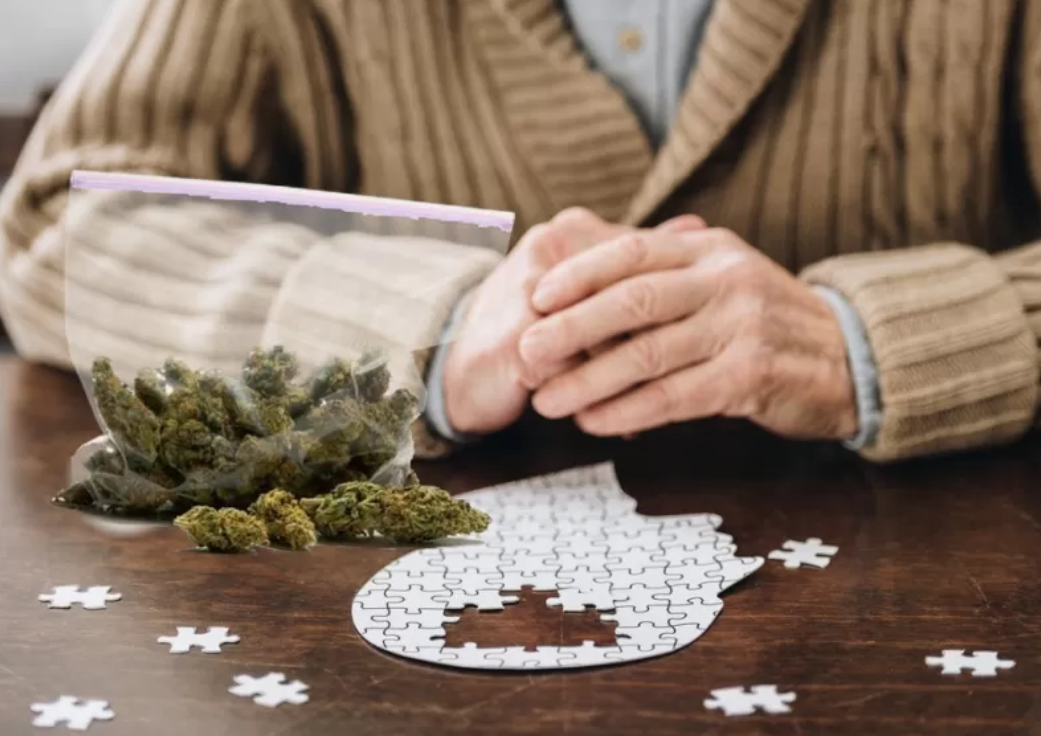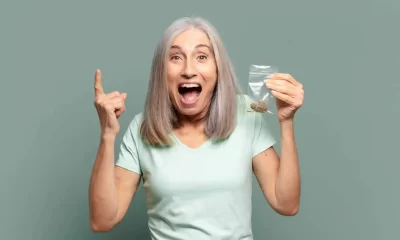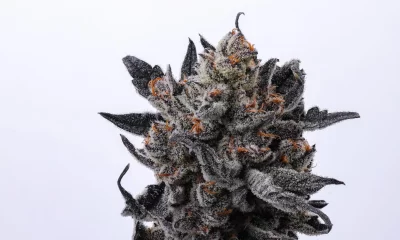Reports
Cannabis Is Indeed the Best Natural Treatment for Parkinson’s Disease New Medical Studies Show

Recent Studies Show That Cannabis Is Indeed The Best Natural Treatment For Parkinson’s Disease
Parkinson’s disease is one of the most common neurodegenerative disorders.
It was named by Jean-Martin Charcot, a French neurologist, back in 1872 after the disease was first identified by James Parkinson in 1817. Over a century later, there is still no known cure for this disease which robs people of their dignity and quality of life. However, there have been numerous modern treatments that have been developed including dopamine therapy, surgery, and even deep brain stimulation for healing the affected area in the brain.
The problem with pharmaceutical medications which have been designed for Parkinson’s disease is that they also leave patients with numerous unwanted side effects. These drugs are primarily intended to increase dopamine levels since the symptoms of Parkinson’s occur when dopamine levels drop too low. While all Parkinson’s patients experience different symptoms, the common medications used are all the same; these include Levodopa, dopamine agonists, anticholinergics, glutamate antagonist, COMT inhibitors, and MAO-B inhibitors.
The side effects from Parkinson’s medications include nausea, low blood pressure, involuntary movements, hallucinations, confusion, and behavioral issues – such as the uncontrollable need to have sex or gamble.
Thankfully, more patients are finding hope using cannabis-based medications.
What The Studies Say
In 2021, a survey sent amongst patients with Parkinson’s disease in Germany analyzed the impact of cannabis products. The results, which were published in the Journal of Parkinson’s Disease, reported that more than half of the patients acknowledge positive clinical results. In Germany, THC products can already prescribed for cases where conventional medications did not work. Meanwhile, CBD can be obtained without a prescription from the internet as well as pharmacies.
“Medical cannabis was legally approved in Germany in 2017 when approval was given for therapy-resistant symptoms in severely affected patients independent of diagnosis and without clinical evidence-based data,” says the study’s lead researcher, Professor Carsten Buhmann of Germany’s University Medical Center Hamburg-Eppendorf Department of Neurology. The researchers intended to analyze prescriptions of MMJ then assess the feedback from patients who were using it. The study was cross-sectional, nationwide, and used a questionnaire format. Afterwards, 1,300 questionnaires were completed.
They found that 54% of existing patients who were using cannabis strains for Parkinson’s said they were beneficial and it was overall tolerated well. More than 40% of them said marijuana was effective in managing muscle cramps and pain, while over 20% said that it helped reduce stiffness, anxiety, tremors, freezing, and restless legs.
“Our data confirm that PD patients have a high interest in treatment with medicinal cannabis but lacked knowledge about how to take it and especially the differences between the two main cannabinoids, THC and CBD,” Buhmann added.
The Michael J Fox Foundation (MJFF) also conducted a recent survey through their online platform called Fox Insight. The MJFF was established to spread awareness on Parkinson’s disease, conducts research through patient engagement with the hopes of finding an objective test, and supports development of new treatments.
Researchers at the University of Colorado namely Samantha Holden, MD, MS, and her colleagues polled participants about the type of cannabis they consume, and how much CBD and THC; they also inquired how often they consume it and how long they were medicating with it.
Almost 1,900 patients with Parkinson’s disease shared their feedback. The results, which were released in the Movement Disorders Clinical Practice journal, revealed that over 70% of patients use marijuana, most commonly through oral consumption, once a day. While some of them weren’t sure about the kind of cannabis they were taking, almost half were taking high CBD products while 15% took almost equal amounts of CBD and THC.
Many patients said that the cannabis helped them with pain, agitation, anxiety, or sleep.
Then in a 2022 survey among 1,881 patients with Parkinson’s disease, researchers from the University of Colorado Anschutz Medical Campus analyzed symptoms and prescription medication consumption after cannabis was given.
The data revealed that respondents found the most benefits for cannabis in the areas of pain, sleep, anxiety, and agitation after using either whole plant cannabis or CBD. However, patients who were also using high potency THC reported improvements in depression, tremors, appetite, and nausea though they found that it worsened bradykinesia, a Parkinson’s symptom associated with slow movements. Just like with other studies, many respondents said that cannabis was effective in helping them discontinue prescription drugs especially those that were used for anxiety and pain.
“These survey results offer a broad overview of real-world use patterns and experience among a large group of people living with PD and provide initial results regarding the differential symptomatic effects of higher THC versus higher CBD products,” concluded the authors. “In summary, people with PD report that cannabis subjectively improves some PD-related symptoms, with higher THC products conferring more frequent benefits than higher CBD products,” the authors concluded.
“Next steps should include more rigorous, controlled studies, informed by the results herein, to more objectively study the effects of varying types of cannabis on PD symptoms, as well as the impact of the different methods of ingestion and specific doses,” they wrote.
Conclusion
With all the tremendously positive feedback from patients, it shows that cannabis is promising as a natural alternative to current Parkinson’s medications. There’s still much we don’t know about it such as the best THC:CBD ratio and route of administration, but with more studies like this out there, we should know more in no time.
Business
Pot Odor Does Not Justify Probable Cause for Vehicle Searches, Minnesota Court Affirms

The Minnesota Supreme Court affirmed that cannabis odor does not constitute probable cause to search a vehicle.
If Minnesota police search a vehicle solely based upon the smell of pot, they can’t justify searching a vehicle, even if there is evidence found of other alleged crimes. Even after appealing a lower court decision to suppress the evidence—twice—the Minnesota Supreme Court agreed, and the dismissal of his charges stands.
In a ruling filed regarding a case the State of Minnesota Court of Appeals on Sept. 13, the Minnesota Supreme Court affirmed that cannabis odor does not constitute probable cause to search a vehicle.
The case has been ongoing for two years. On July 5, 2021, just before 10 p.m., a Litchfield police officer stopped a car for an obscure local law: the light bar mounted on the vehicle’s grill had more auxiliary driving lights than are permitted under Minnesota law. The officer asked the driver, Adam Lloyd Torgerson, for his license and registration. Torgerson, his wife, and his child were present in the vehicle. The officer stated that he smelled pot and asked Torgerson if there was any reason for the odor, which he initially denied. But cops found a lot more than just pot.
A backup officer was called in. The couple denied possessing any pot, but Torgerson admitted to smoking weed in the past. The second officer stated that the weed odor gave them probable cause to search the vehicle and ordered them to exit the vehicle. The first officer searched the vehicle and found a film canister, three pipes, and a small plastic bag in the center console. The plastic bag contained a white powder and the film canister contained meth, which was confirmed in a field test.
Torgenson was charged with possession of meth pipe in the presence of a minor and fifth-degree possession of a controlled substance after the unwarranted search of Torgerson’s vehicle.
Police Aren’t Allowed to Do That, Multiple Courts Rule
But the search had one major problem—cops weren’t searching for a meth pipe. They only searched his car because they could smell pot, and the meth and paraphernalia were a surprise for everyone. Still, they had no grounds to search the vehicle. The man’s charges were later dismissed after the district court determined the odor of cannabis alone was insufficient basis for probable cause to search the vehicle, regardless of whatever other drug paraphernalia they found.
The state appealed the case, but the Minnesota Court of Appeals affirmed the district court’s decision. The case was appealed a second time, this time to the Minnesota Supreme Court, which agreed with the lower court’s ruling.
“This search was justified only by the odor of marijuana emanating from the vehicle,” the Minnesota Supreme Court decision reads. “Torgerson moved to suppress the evidence found during the search, arguing that the odor of marijuana, alone, is insufficient to create the requisite probable cause to search a vehicle under the automobile exception to the warrant requirement. The district court granted Torgerson’s motion, suppressed the evidence, and dismissed the complaint. The State appealed. The court of appeals affirmed the district court’s suppression order. Because we conclude that the odor of marijuana emanating from a vehicle, alone, is insufficient to create the requisite probable cause to search a vehicle under the automobile exception to the warrant requirement, we affirm.”
It amounts to basic human rights that apply—regardless of whether or not a person is addicted to drugs.
Other States do Precisely the Same Regarding Pot Odor as Probably Cause
An Illinois judge ruled in 2021 that the odor of cannabis is not sufficient grounds for police to search a vehicle without a warrant during a traffic stop.
Daniel J. Dalton, Associate Judge of the 14th Judicial Circuit, issued a ruling in response to a motion to suppress evidence in the case of Vincent Molina, a medical cannabis patient arrested for cannabis possession last year.
In that case, Molina was arrested despite the decriminalization of small amounts of cannabis in Illinois in 2019 with the passage of the Illinois Cannabis Regulation and Tax Act.
In some states, the issue of probable cause and cannabis was defined through bills.
Last April, the Maryland House of Delegates approved a bill that reduces the penalties for public cannabis consumption and bars police from using the odor of cannabis as the basis for the search of an individual or auto. Under Maryland’s House Bill 1071, law enforcement officers would be prohibited from using the odor of raw or burnt cannabis as probable cause to search a person or vehicle.
The rulings represent the rights of citizens when they are pulled over by police, even if there are hard drugs involved.
Business
Legal Marijuana Handed A Nothing Burger From NY State

Following the chaos of the recreational weed rollout, the government is trying to figure out next steps. But it seems legal marijuana has been handed a nothing burger from NY state with their last rollout for potential cannabis retailers.. With an estimated $3.5 billion in sales at stake along with tax revenue for the state’s every growing budget, the fumble is costly for a significant number of players. And it has been a huge loss for the marijuana industry as a whole.
What was quickly seen as an opportunity was pounced on in the city with the most billionaires globally along with endless big and small entrepreneurs, and hustlers. Seeing a huge amount of cash on the table, players acted in a quickly in a way bureaucrats will never understand.
Embracing a Wild West approach, officials decriminalizated and fumbled licensed legalization of sales. Despite promises and initial outlines where existing medical marijuana dispensaries could switch to recreational and a fair, for government quick liscnese process, the state tossed it all in one stroke. In a vision of equity, officials decided to reserve the first retail licenses for felons and other “justice-involved” individuals. Lawsuits started, the desired licensees struggled to raise capital and over 1,600 unlicensed retail stores opened in NYC. For the small time players, they have set sidewalk card tables parks, selling roll-ups and handmade marijuana edibles, in full view of the police.
The updated systems was rolled out, but has left people confused, dispirited, and disappointed. The Office of Cannabis Management rolled out the previous Conditional Adult-Use Retail Dispensaries (CAURD) program with high hopes. Now, regulators voted to allow the state’s medical marijuana operators to apply for adult-use retail licenses. Multistate operators who have patiently acquired a majority of the state’s 10 registered organization.
“It was more like an orgy of minimalism. While they are getting ready to open the application window on October 4th (notably, originally it wasn’t intended to be a 60-day window, but rolling applications) for most license types (sans on-site consumption and delivery), they refused to address the CAURD program. Other than to suggest that it remains “a priority”, they have offered only some subtle hints in the guidance to the regulations. These include establishing a priority for retail applications which include secured real estate, which will be given priority after the initial 30-days of the 60-day application window have passed (although they do not define what that means). And noting that existing licensees may apply for an additional license so long as they comply with the rules of a two-tier system. The positive news is that these statements can be interpreted as an invitation to current CAURD licensees, many of whom will also meet other Social and Economic Equity (SEE) criteria entitling them to an additional priority.” shares Andrew Cooper, partner at Falcon Rappaport & Berkman LLP, one of the top cannabis law firms.
Unfortunately, there are multiple losers in the state’s unique approach. One is consumer and medical marijuana patients, including veterans. The unlicensed dispensaries are making a mint and overcharging customers due to high demand. Small investors and companies, including those who could be a player in the CAURD, will not have the financial to compete with multi-state and large players. And taxpayers will lose out for years to come as revue it lost to unlicensed dispensaries.
The good news, consumers will continue to find products easily over the next few years. There is even a thriving unlicensed dispensary a few blocks from City Hall.
While New York is awash with billionaires, fashion, food and smarts, common sense seems to be lack for making a good government plan.
Source: https://thefreshtoast.com/cannabis/legal-marijuana-handed-a-nothing-burger-from-ny-state/
Healthcare
This Activity Helps Those With Depression And Anxiety

A new study shows that exercise is extremely helpful for people coping with a mental health condition, affecting them more than people who don’t share these struggles.
One of the activities that people first recommend when discussing conditions like depression and anxiety is exercise. The suggestion is so pervasive that it’s almost a cliche by now. Still, evidence shows that exercise is incredibly helpful for your mental health, decreasing muscle tension, promoting the production of serotonin, and more.
A British study suggests that people with depression and anxiety are twice as likely to reap the benefits of exercise when compared to people who don’t suffer from these conditions.
The data was obtained by tracking the exercise patterns of over 50,000 people in their late fifties. About a third of them were affected by health conditions like depression and anxiety. While everyone experienced benefits from moderate amounts of exercise, people who had a mental health condition experienced 22 percent less risk of having a heart attack or a blocked coronary artery. For reference purposes, the majority of candidates only experienced a 17 percent decrease in their odds of suffering from a cardiac condition.
“The effect of physical activity on the brain’s stress response may be particularly relevant in those with stress-related psychiatric conditions. This is not to suggest that exercise is only effective in those with depression or anxiety, but we found that these patients seem to derive a greater cardiovascular benefit from physical activity,” said the lead researcher of the study, Hadil Zureigat.
Anxiety and other forms of stress can result in inflammation, a condition that creates risks for people’s circulatory systems. The effect of exercise targets different risk factors for people with an existing mental health condition, reducing the cortisol in their bodies and increasing cardiovascular health, all the while producing serotonin and boosting their moods.
Introducing a workout routine into your life when you don’t have one isn’t easy, but it’s often suggested to start off slow, taking your time to find an activity you find enjoyable. Just one exercise session can make you feel better, but the more you commit to it, the easier it gets to create a habit. Try working out with friends, outdoors, signing up to sports or classes — whatever keeps you accountable, and returning to your activity.
Source: https://thefreshtoast.com/news/this-activity-helps-those-with-depression-and-anxiety/
-

 Business2 years ago
Business2 years agoPot Odor Does Not Justify Probable Cause for Vehicle Searches, Minnesota Court Affirms
-

 Business2 years ago
Business2 years agoNew Mexico cannabis operator fined, loses license for alleged BioTrack fraud
-

 Business2 years ago
Business2 years agoAlabama to make another attempt Dec. 1 to award medical cannabis licenses
-

 Business2 years ago
Business2 years agoWashington State Pays Out $9.4 Million in Refunds Relating to Drug Convictions
-

 Business2 years ago
Business2 years agoMarijuana companies suing US attorney general in federal prohibition challenge
-

 Business2 years ago
Business2 years agoLegal Marijuana Handed A Nothing Burger From NY State
-

 Business2 years ago
Business2 years agoCan Cannabis Help Seasonal Depression
-

 Blogs2 years ago
Blogs2 years agoCannabis Art Is Flourishing On Etsy













